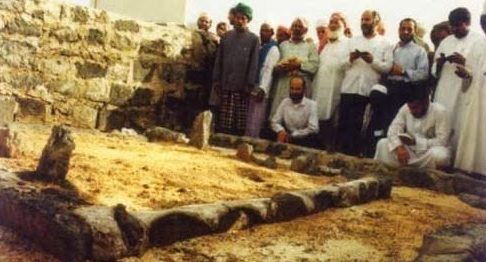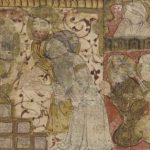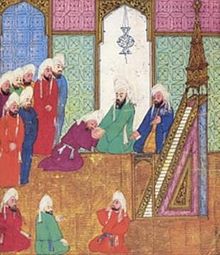
Since the emergence of their school, the Islamists have tried to cultivate the idea of relationship through faith, the strength of the brotherly bond that prevailed between the Companions as being an intimate relationship, and the sincere brotherhood that derived from the morals of the noble Qur’ān.
WE WILL THEREFORE refer to the books of the Muslims to find out just how deep that brotherly relationship was, according to the ‘most reliable’ historical sources and the ṣaḥīḥ books of hadith. We will start here with the relationship between the four great Companions – Abū Bakr, ‘Umar, ‘Uthmān and ‘Alī. With regard to the relationship between Abū Bakr and ‘Umar ibn al-Khaṭṭāb, Al-Bukhārī said the following: [1]
Ṣafwān ibn Jamīl al-Lakhmī relates that Nāfi’ ibn ‘Umar told us that Ibn Abi Malīka said “the two righteous pesons were about to be ruined”. They were Abū Bakr and ‘Umar who raised their voices in the presence of the Prophet when a mission from the Banū Tamīm came to him. One of the two recommended al-Aqra‘ ibn Ḥābis the brother of Banī Mujāshi‘ while the other recommended somebody else (whose name I do not remember). Abū Bakr complained to ‘Umar: “You only want to contradict me!” And they raised their voices. It was for this reason that God then revealed the verse:
O you who believe! do not raise your voices above the voice of the Prophet, and do not speak loud to him as you speak loud to one another, lest your deeds became null while you do not perceive.[2]
Abū Bakr told ‘Umar what he thought of him, that he might have been a big shot in the pre-Islamic era but in Islam he was a mere weakling – as related in Al-Durr Al-Manthūr from the historians al-Bayhaqī and Ibn ‘Asākir.
And as al-Ḥāfiẓ Ibn Ḥajar al-‘Asqilānī relates in his book Fatḥ al-Bārī [3] “Umar cast out Abū Bakr’s sister when she started complaining”. Ibn Sa‘d recorded this in his Al-Ṭabaqāt with a full chain of references from of Al-Zuhrī and from Sa ‘īd ibn al-Musayyib who wrote:
When Abū Bakr died, ‘Ā’isha arranged for women to mourn for him. ‘Umar got to hear of this and banned them, but they refused to stop. He then said to Hishām ibn al-Walīd, “Go to the house of Abū Qaḥāfa, meaning Umm Farwa, and they thrashed her with a whip. The mourning ceased when they heard about that.”
Isḥāq ibn Rāhawayh narrated in his Musnad another aspect of this story, again from al-Zuhrī:
He began to take the women out one by one beating them with a whip. After the death of Abū Bakr, ‘Ā’isha, his daughter, and her sister Asmā’ along with his sister Umm Farwa, arranged for a session of mourning for Abū Bakr with other women with them. ‘Umar along with Hishām ibn al-Walīd turned up with his whip, and even stood at the door of the room so that they could hear his voice. But they did not desist and so he said out loud: “Hishām, go inside and bring me out the daughter of Abū Qaḥāfa (the sister of Abū Bakr). ‘Ā’isha heard him and when Hishām tried to enter she said to him: I will make my entire household cause you embarrassment!” ‘Umar then said to him, “Go on in, for I have given you permission!” So Hishām entered, recognised Umm Farwa and took her to ‘Umar and he set about her with his whip! He thrashed her and the women scattered”.[4]
Another narration mentions that Umm Farwa lost the sight of one eye as a result of her severe beating at the hands of the new caliph ‘Umar ibn al-Khaṭṭāb.[5] The most famous incident indicating the intimate relationship between the four great Companions was narrated by Abū Bakr ibn Abī Shayba in his Muṣannaf[6]
Muḥammad ibn Bishr – from ‘Ubayd Allāh ibn ‘Umar and Zayd ibn Aslam from his father Aslam relates that when the pledge of allegiance was made to Abū Bakr after the death of the Messenger of God, ‘Alī and Zubayr used to go to Fāṭima, the daughter of the Messenger of God, to consult with her on matters, and when this reached ‘Umar ibn al-Khaṭṭāb, he went out to Fāṭima and said: “O daughter of the Messenger of God. By God, no one is more beloved to us than your father, and no one is more beloved to us after your father than you. But, by God, if these individuals gather with you, who is going to stop me burning down their houses?” He went on to relate how, when ‘Umar went out the others came to ‘Ā’isha and she said to them: “You know that ‘Umar came to me and swore by God that if you do this again he will burn your houses down on top of you. So do the right thing and do not return to me.” So they left her and did not return to her until they had pledged allegiance to Abū Bakr.
This narration was included by Muḥammad ibn Jarīr al-Ṭabarī in his history known as The History of the Messengers and Kings.[7] He records how Ibn Ḥamīd said that:
‘Jarīr told us, from Mughayra and from Ziyād ibn Kulayb: “’Umar ibn al-Khaṭṭāb came to ‘Alī’s house where Ṭalḥa, al-Zubayr and men from the Muhājirīn had gathered, and said: ‘By God, either you go out to pledge allegiance or I will burn them over your heads”. After which al-Zubayr went out against him.
Al-Baladhurī narrates in his book Ansāb al-Ashrāf: [8]
Abū Bakr commanded ‘Umar ibn al-Khaṭṭāb with respect to ‘Alī ibn Abī Ṭālib, to “take care of him with the utmost violence!” Abu Bakr had sent to ‘Alī to demand of him his pledge of allegiance. But he did not do so and so ‘Umar came with a torch wick, and when Fāṭima received him at the door she said: “O Ibn al-Khaṭṭāb, are you about to burn ‘Alī at my door?” He said: “Yes, and with something stronger than what your father brought!”[9]
Al-Ṭabarī narrates how:
‘Umar ibn al-Khaṭṭāb came to ‘Alī’s house where Ṭalḥa, al-Zubayr and men from the Muhājrīn had gathered, and al-Zubayr went out on him armed with a sword. But he stumbled, the sword fell from his hand and they jumped on him and took him away.”[10]
He goes on to detail how:
‘Umar went with a gang that included Muḥammad ibn Maslama, Usayd ibn Ḥuḍayr and Salama ibn Aslam to Fāṭima’s house, and said to those gathered there: “Go and pledge allegiance!”. But they refused to do so and al-Zubayr came out at them with his sword. Whereupon ‘Umar said: “The dog’s got you!” (by ‘dog’ he meant al-Zubayr ibn al-‘Awwām). Salama ibn Aslam then jumped on him, took the sword from his hand and struck it against a wall.
Abū Bakr al-Khalāl in the work Al-Sunna[11] writes:
“Muḥammad ibn ‘Alī related that al-Athram said that he heard that Abū ‘Abdullāh had been related a hadith by ‘Aqīl – on the authority of al-Zuhrī, from ‘Urwa, from ‘Ā’isha, from the Prophet concerning ‘Alī, and from al-‘Abbās, and Aqīl from al-Zuhrī, that Abū Bakr ordered Khālid to kill ‘Alī, but that Abu Abdullah said: “How can this be? He did not know ‘Ā’isha”. And he said: “I am not happy with you writing down such things!”
Ibn ‘Abd Rabbih narrated this same incident in his work Al-‘Iqd al-Farīd,[12] writing:
‘Alī, al-‘Abbās and al-Zubayr sat in Fāṭima’s house until Abū Bakr sent ‘Umar ibn al-Khaṭṭāb to tell them to leave Fāṭima’s house and said to him that if they refused he was to fight them. He went with a lit torch threatening to set the house on fire over their heads. Fāṭima received him at her door and said: “Ibn al-Khaṭṭāb, did you come to burn down our house?” He replied: “Yes!” [13]
Al-Ḥāfiẓ al-Ṭabarānī narrates in Al-Mu‘jam al-Kabīr [14] the following words of Abū Bakr:
As for those three women, I wish that I did not have to do what I did. I wish that I had never found out about Fāṭima’s house and that I had left it alone and that it had been closed off from war.
This same narration was given by Muḥammad Ibn Jarīr al-Ṭabarī in his The History of the Messengers and Kings)[15].

Suggested Reading
Al-Ḥāfiẓ al-Ṭabarānī in Al-Mu‘jam al-Kabīr, and al-Ṭabarī in his History related an account confirming Abū Bakr’s ordering of an attack on the house of Fāṭima al-Zahrā’. The account was given by Al-Ḥāfiẓ al-Qāsim ibn Salām in his work Al-Amwāl in which he stated that he deleted the passage indicating Abū Bakr’s admitting to the attack. The account given in the narration by Al-Tabarani – “As for those three women, I wish that I did not have to do what I did. I wish that I had never found out about Fāṭima’s house and that I had left it alone” – and the narration by al-Ṭabarī: “As for those three women, I wish that I had left them alone, that I had never found out anything about Fāṭima’s house, and that they had been locked away from the war”, this was referenced by al-Bukhārī himself in his Ṣaḥīḥ:
Fāṭima, the daughter of the Messenger of God became angry with Abu Bakr and shunned him, and she continued to shun him until she died.[16]
Al-Bukhārī narrated in his chapter on the Battle of Khaybar that Fāṭima, the daughter of the Messenger of God found out about Abū Bakr and shunned him and until she died did not speak to him. She lived for six months after the Prophet, and when she died her husband ‘Alī buried her at night, since Abū Bakr had not given his permission for the burial.[17]
[2] Qur’ān XLIX (al-Ḥujrāt), 2.
[3] Ibn Ḥajar al-‘Asqilānī, فتح الباري بشرح صحيح البخاري Vol. 6, p. 225, دار طيبة للنشر والتوزيع, Third Edition 1431 AH / 2010 AD.
[4] تاريخ الطبري vol. 3, p.421, طبقات ابن سعد, vol. 3, p.209.
[5] كنز العمال vol. 8, p. 118, The Book of Death; تاريخ الطبري, part 4, incidents of the year 13, by Ibn al-Athīr, part 2, p.204.
[6] Al-Muṣannaf, vol. 20, p. 579, Hadith number 38200, Ed. Muhammad ‘Awwāma, Dar Al-Minhāj.
[7] Part Three, p.202 ff.
[8] Part Two, p.11
[9] انساب الاشراف Vol. 1, p.586; Abū al-Fidā’ (ob.732 AH): المختصر في تاريخ البشر – Chapter on ‘Abū Bakr’.
[10] تاريخ الطبري, Vol. 2, p.443.
[11] السنة Part III p.505, Hadith No. 809, ed. Dr. ‘Aṭiya al-Zahrānī, Dar Al-Raya Publications.
[12] العقد الفريد Part V, ed. Dr. ‘Abd al-Majīd al-Tarḥīnī, p.13.
[13] The same story was recorded by Abū al-Fidā’ in the work المختصر في تاريخ البشر, p.156. (For those who do are unaware who Fāṭima is, she is the daughter of Muḥammad the Messenger of God).
[14] المعجم الكبير ed. Ḥamdī ‘Abd al-Majīd al-Salafī, p.62, Dar Iḥyā’ al-Turāth al-‘Arabī.
[15] Ed. Muḥammad Abū al-Faḍl Ibrāhīm, Part III, p.430.
[16] Ṣaḥīḥ al-Bukhārī, chapter: Farḍ al-Khums, Hadith No. 3093.
[17] Al-Bukhārī Kitāb al-Maghāzī, Hadith No. 4240, 4241 .
Main image: Visitors attending the reputed grave of Fāṭima, the daughter of the Prophet in the Al-Baqi’ cemetery, Makka.

